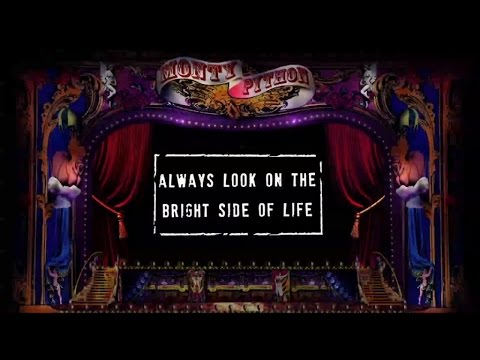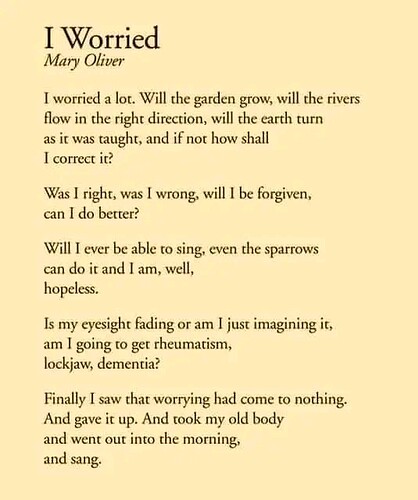That’s why I can’t get behind politicians, you know. 'Cause they’re always like “Our biggest problem today is unemployment”. And I’m like “What about getting old and sick and dying?” […] Seriously, if there was a politician ever that said “By my second term, there will be no death” […] I’d just give that guy all my money, and I’d sit on a chair.
-Norm MacDonald
Oh baby I’m thinkin’ about your body†
Thinkin’ about your face‡
~ Bobby McFerrin
† decomposing in a charnel ground
‡ being picked apart by crows
Truth is a pathless land
Jiddu Krishnamurti
Faith and Belief
Give us this day our daily faith, but deliver us, dear God, from Belief.
Aldous Huxley, Island
Sort of depends.
If the sentence is read in goal language/framework, then it’s wrong, against buddhist principles. There’s very clearly kamma which is an impersonal universal law, with clear good and bad side.
If it is read as method framework, then it can be an expression of suspending reaction part of mindfulness. So one doesn’t feel so keen on reacting with aversion or greed towards bad or good.
The point of method framework is that it’s not true in goal framework, but it’s a useful method to get to the goal of abandoning covertousness and grief with regards to the world.
It also has similar vibe with “Good, bad, who knows” story.
Note: I have no idea what Hamlet’s story is, I might had read some summary of it, but still no impression of him. So the analysis is only based on the sentence, not Hamlet, not the background source.
Much of Stoicism “could be Buddhist, but isn’t”.
Despite different metaphysics, much of the advice is derived from looking at reality as it is, so perhaps it should not be a surprise, but it is inspiring that two very different sets of people came up with very similar prescriptions for life.
Thanks for the passage from Cassian. I’ve always found the Desert Fathers and Mothers to be a great source of inspiration and wisdom.
For life is quite absurd,
And death’s the final word,
You must always face the curtain with a bow,
Forget about your sin,
give the audience a grin,
Enjoy it, it’s you last chance of the hour.
So, always look on the bright side of death,
Just before you draw your terminal breath,
Life’s a piece o’ ![]() ,
,
When you look at it,
Life’s a laugh and death’s a joke it’s true,
You’ll see it’s all a show,
Keep 'em laughing as you go,
Remember that the last laugh is on you.
And, always look on the bright side of life,
Always look on the right side of life,
Come on, Brian cheer up,…
Yes! The desert fathers and the stoics are definitely good non-Buddhist Buddhism, Ecclesiastes too I think has a fairly Buddhist flavour, might try and hunt down a suitable quote from there…
Ecclesiastes comes off more Hedonist than Ascetic like Stoicism and Buddhism. Ecclesiastes is more like “you’re going to die so wear nice clothes, eat good food, get drunk and make merry”. Old judaism didn’t teach afterlife until it got mixed in with the persian empire and Cyrus the great influenced it with heaven/hell ideology, which led to the schism between Pharisees and the Sadducees.
I was thinking of “all is vanity” and “the eye is not satisfied with seeing, nor the ear filled with hearing.” And “Better is an handful with quietness, than both the hands full with travail and vexation of spirit.”
Better is a poor and a wise child than an old and foolish king, who will no more be admonished.
10 He that loveth silver shall not be satisfied with silver; nor he that loveth abundance with increase: this is also vanity.
11 When goods increase, they are increased that eat them: and what good is there to the owners thereof, saving the beholding of them with their eyes?
12 The sleep of a labouring man is sweet, whether he eat little or much: but the abundance of the rich will not suffer him to sleep.
13 There is a sore evil which I have seen under the sun, namely, riches kept for the owners thereof to their hurt.
14 But those riches perish by evil travail: and he begetteth a son, and there is nothing in his hand.
Here are some nice ones in the movie Matrix.
On death.
You hear that Mr. Anderson?.. That is the sound of inevitability… It is the sound of your death… Good bye, Mr. Anderson.
- ‘The Matrix’, 1999.
On samsāra.
Have you ever stood and stared at it? Marvelled at its beauty, it’s genius. Billions of people, just living out their lives… oblivious.
-Agent Smith, ‘The Matrix’, 1999.
On anattā.
Agent Smith: You’re empty
Neo: So are you.
‘The Matrix’, 1999.
On existence and delusion.
We’re not here because we’re free. We’re here because we’re not free. There’s no escaping reason. No denying purpose. Because as we both know without purpose, we would not exist."
-Agent Smith, ‘The Matrix Reloaded’, 2003.
On being shown the way, but walking alone.
Neo: I know what you’re trying to do.
Morpheus: I’m trying to free your mind, Neo. But I can only show you the door. You’re the one that has to walk through it.
-‘The Matrix’, 1999.
On Letting go and freedom.
You have to let it all go, Neo. Fear, doubt, and disbelief, Free your mind.
-Morpheus, ‘The Matrix’, 1999.
“Not known, because not looked for
But heard, half-heard, in the stillness
Between two waves of the sea.
Quick now, here, now, always–
A condition of complete simplicity
(Costing not less than everything)” -
- Little Gidding , T.S. Eliot
“This is rather as if you imagine a puddle waking up one morning and thinking, ‘This is an interesting world I find myself in — an interesting hole I find myself in — fits me rather neatly, doesn’t it? In fact it fits me staggeringly well, must have been made to have me in it!’ This is such a powerful idea that as the sun rises in the sky and the air heats up and as, gradually, the puddle gets smaller and smaller, frantically hanging on to the notion that everything’s going to be alright, because this world was meant to have him in it, was built to have him in it; so the moment he disappears catches him rather by surprise. I think this may be something we need to be on the watch out for.”
― Douglas Adams, [The Salmon of Doubt]
The Electric Monk was a labour-saving device, like a dishwasher or a video recorder… Electric Monks believed things for you, thus saving you what was becoming an increasingly onerous task, that of believing all the things the world expected you to believe.
Dirk Gently’s Holistic Detective Agency
Something in German:
Ach, was winkt ein schöner Lohn
doch der Deeskalation!
Reizte man nicht mehr die Bösen,
könnt’ man sie davon erlösen,
dass sie alles kurz und klein
schlagen und noch dazu schrein!
Besser wär’s, wenn die Verhauten
sich nicht auch dasselbe trauten,
wer zurückhaut, fördert halt
die Spirale der Gewalt.
Der Geschlagene, der nicht tobt,
der wird allgemein gelobt.
(Roughly:
Oh, what a pretty reward
is there for de-escalation!
No longer provoking the wicked,
we could release them
from smashing everything into pieces
and screaming on top of it!
It would be better, if the beaten
would not dare doing the same thing,
who hits back simply supports
the spiral of violence.
The beaten who does not rage
is generally praised.)
- Alfons Klein (published in a book “100 texts for peace”, April 2022)
The poem is in the style of Wilhelm Busch, who, by the way, also wrote some pretty Buddhist stuff.
On hearing this poem, it immediately remeinded me of Dhp 3–5:
“They abused me, they hit me!
They beat me, they robbed me!”
For those who bear such a grudge,
hatred never ends.
“They abused me, they hit me!
They beat me, they robbed me!”
For those who bear no such grudge,
hatred has an end.
For never is hatred
settled by hate,
it’s only settled by love:
this is an ancient law.
This might be a bit too obvious and well-known.
“In the ignorance that implies the impression that knits knowledge that finds the nameform that whets the wits that convey contacts that sweeten sensation that drives desire that adheres to attachment that dogs death that bitches birth that entails the ensuance of existentiality.”
—James Joyce, Finnegans Wake
We own nothing
Nothing is ours
Not even love so fierce it burns like baby stars
But this poverty is our greatest gift
The weightlessness of us as things around begin to shift
From the song “Everything in its Own Time” by Indigo Girls

